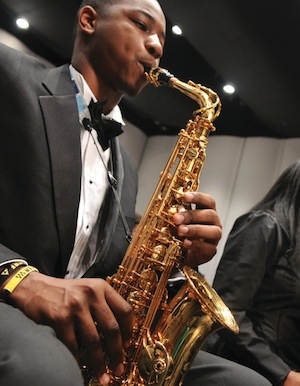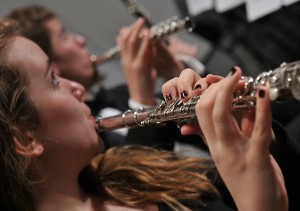How can you tell whether attending an arts high school is a good fit for you, your child, or your student? What can be gained from attending an arts school that would otherwise not be available? And how does it impact your acceptance to college?
Arts high school administrators and college music school admission directors offer insights and wisdom to assist you in thinking about what makes sense.
Benefits of attending an arts high school for music
Arts-focused high schools inspire an environment of creativity. According to Jamie Knight, Music, Media & Entertainment Technology department chair at Huntington Beach High School’s Academy for the Performing Arts, creativity is the #1 skill required in the 21st century. Donn Harris, executive and artistic director of Oakland School for the Arts, agrees. “Regardless of whether you go on in music, creativity is important in whatever you do, even in areas like medicine and politics,” he says.
“Attending a performing arts high school is a great way to discover what it’s like to study music in college, and/or professionally. It is helpful to think of the experience as job training, learning the ways of the performing arts culture and history in a safe environment,” offers Paris Brown, former director of Lawrence University Conservatory admissions. She sees a number of Lawrence applicants come through arts high schools.
Nadine Abigaña, associate director of college counseling at Walnut Hill School for the Arts, says that at her school, students “benefit from being surrounded by peers who value process, strive for excellence, engage deeply in their own learning, and ultimately enjoy a range of options for college, conservatory, and career. The community is especially powerful and compelling because its members — students, faculty and staff alike — share a deep passion for making and celebrating art.”
As a freshman, Bryan Dunnewald attended a conventional high school in his hometown in Colorado. After spending the summer at Interlochen Summer Arts Camp, he transferred to Interlochen Arts Academy High School to continue to pursue his passion for studying organ, and never looked back.
“Studying at an arts school gave me the opportunity to study and live amongst other talented students. While great teachers exist all around the world, studying at Interlochen allowed me to learn from the teacher and students. This sharing of artistic ideas and knowledge — the environment in which I lived — is what makes studying at an arts school unique.
“This served me in a number of ways. I was able to learn about other instruments and fields from those who know them best, and apply that to my own musicianship. I was able to have close contact with brilliant teachers who helped me grow faster. I could take part in a larger creative process. And I collaborated with writers, composers, ensembles, and dancers, to name a few. We created new works and shared them with others to inspire them. They, in turn, worked together to inspire us.” Brian went on to Curtis Institute of Music for his Bachelor of Music degree in Organ Performance, and continues to compose, perform, and teach.
Does attending an arts high school give you a leg up when it comes to getting into college for music?
Most arts high schools incorporate a strong music theory and music history component into the curriculum. Donn Harris at Oakland School for the Arts says this training can be difficult to come by in conventional high schools. His school is prepared to take students all the way to the college level in music theory.
Why is this helpful? It allows students to approach college music theory with confidence instead of dread. Many test out of introductory-level college music theory classes. This makes room for more electives, and lessens the burden on students who want to be dual majors or add in a minor.
There are other advantages to attending an arts high school. Paris Brown at Lawrence sees students gaining “the time to dedicate to daily music study” and that it’s this daily practice that can “help students to better prepare for pre-screening recordings and auditions.” In her work with applicants, she sees the arts high schools as “allowing for a balance of music and academic pursuits which is ideal for students attending liberal arts schools or who plan to pursue a double major.”
Kara Golden, associate director of admissions, Mason Gross School of the Arts at Rutgers University, points out that “Although going to a particular high school may prepare an applicant well for an audition, the high school name by no means makes a difference in admissions.” Gaye Matravers, senior associate director of Admissions & Financial Aid at Indiana University Jacobs School of Music, agrees. She says that students need a strong, robust program to participate in at their high schools, recognizing that they can find this at a conventional high school. What’s even more essential are lessons from a highly proficient private teacher.
Who is a good fit?
Arts high schools are demanding. They require more practicing than students are used to. They also require students to successfully navigate a rigorous college preparatory curriculum. They are a good fit for “serious music students” who are “hard and dedicated workers,” says oboist Ryan Zwahlen, chamber musician and former chair of the Music Department at Idyllwild Arts Academy.
Rick Shaw, assistant principal of Denver School of the Arts, says that students who can multi-task and communicate with confidence will fit in well at an arts school like his. In addition, they must be passionate and committed to their art form and willing to be risk-takers.
Andy Bauer, director of Instrumental Music at Lehigh Valley Charter High School for the Arts, adds that “students with prior training in their previous school bands, orchestras, and choirs make the best candidates for acceptance.”
Who’s not?
Not all high school students are ready for the intensity at an arts high school. There’s a level of maturity required for being able to learn the crucial skills of time management and for juggling the demands of music along with academics. “Unmotivated and low energy students don’t fit well,” says David Hamilton, chair of the Music Department at South Carolina Governor’s School of the Arts. “Students who do not want a focused path of artistic study don’t do well.”
For students not ready to tackle the demands of an arts school, a conventional high school with a strong performing arts component is an option.
Private boarding schools are another option for students not quite ready to commit to the demands of an arts school directly after middle school. These schools will all work with older students who are interested and ready to consider transferring.
Those who do enter boarding schools as freshmen benefit from the additional time working with the academic and arts faculties, and performing and learning from like-minded and talented peers. Christopher Hintz, former marketing and communications manager at Interlochen, says students who start as freshmen “build a foundation that will help them in each of their subsequent years of study.”
What if you change your mind about pursuing music?
Arts school administrators recognize that not all of their students will go on to major in music or any of the arts. Still, they believe and can document why attending an arts school is invaluable.
According to Chris Hintz, “Students also regularly enroll in highly selective academic programs that value artists as creative thinkers and unique problem-solvers. From medicine to business, and astrophysics to law, an Interlochen education often leads students to success in fields outside the arts.”
Bryan Dunnewald says that several of his friends have gone on to college in law, psychology, and economics, and “wouldn’t give up their (arts) education for anything…Plus, colleges are looking for more than just 4.0’s and perfect SAT scores…Studying music (or other art) shows dedication and commitment, which they (colleges) also like to see. So if you’re hesitant because you don’t know about going on in the arts, it’s a non-issue.”
Jamie Knight at Huntington Beach Academy for the Performing Arts adds that regardless of whether a student goes on to study and have a career in the arts, they will always be an arts consumer and possibly an arts “hobbyist” as a result of immersing themselves in a creative arts environment in high school.
Academics
Arts high schools include a strong academic component in conjunction with intensive arts study. However, some college-level music schools find that not all arts high school graduates are as academically prepared as they need to be. Gaye Matravers at Indiana University urges high school students to make sure they don’t let the academic aspect slide. She encourages them to start thinking early on about where they may want to apply to college and about what they may want to study. This should help them with college acceptances and with meeting the academic demands of college.
Cost
Arts schools vary greatly in cost. Many are public charter schools connected to a school district; some are independent public charters. While there are no up-front costs at such schools, families are likely to be asked to donate some amount of money to help offset the myriad costs of running the school. They are also likely to be asked for donations of time. In fact, most arts schools depend on a strong parent volunteer base for support.
Private arts schools, especially boarding schools, are expensive. Some families may feel like they have to make a financial choice between sending their children to an arts boarding school or to college. The three private arts boarding schools interviewed for this article all stated that they offer millions of dollars in financial aid to help students who would otherwise not be able to afford to attend. According to Nadine Abigaña at Walnut Hill, this also allows for “a student body reflecting diverse social and economic backgrounds.”
It’s important to note that arts schools typically have dedicated college counselors available to help students figure out where to apply and how to get scholarships to offset the cost of college.




Leave a Reply